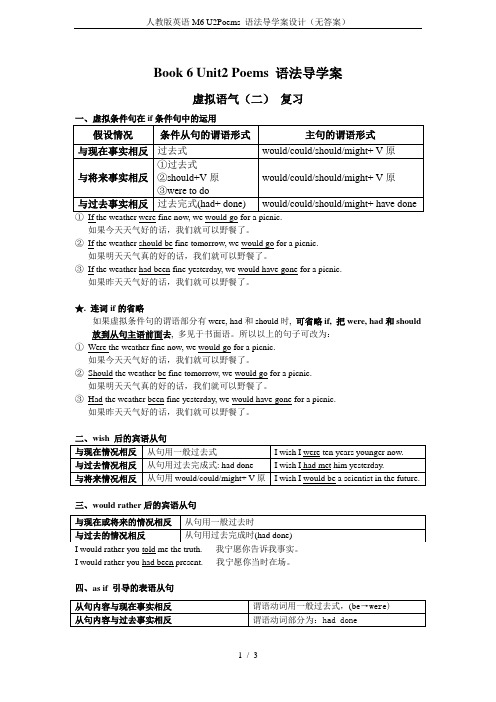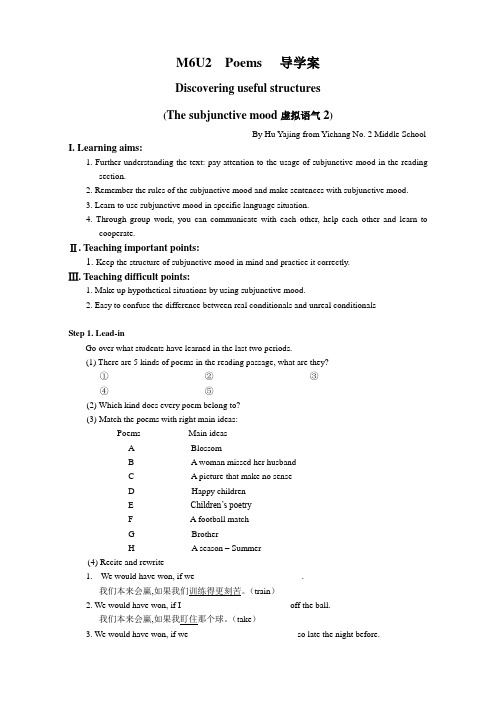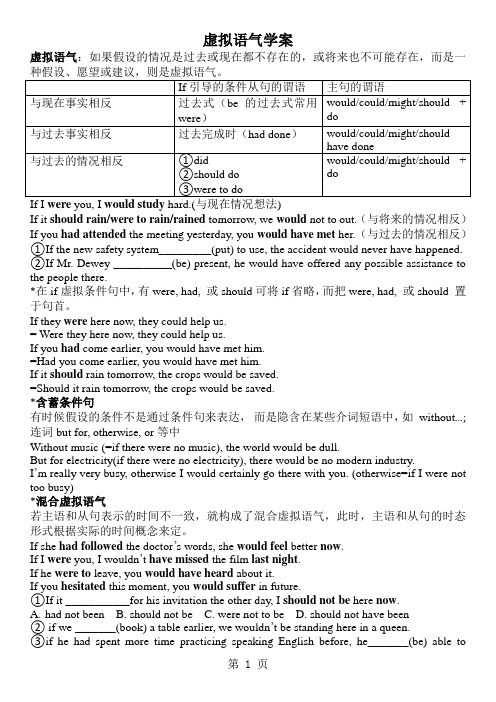高中英语导学案与练习Unit 2 Poem知识讲解 虚拟语气(2)
- 格式:doc
- 大小:90.00 KB
- 文档页数:6


Book 6 Unit2 Poems 语法导学案虚拟语气(二) 复习① If the weather were fine now, we would go for a picnic.如果今天天气好的话,我们就可以野餐了。
② If the weather should be fine tomorrow, we would go for a picnic.如果明天天气真的好的话,我们就可以野餐了。
③ If the weather had been fine yesterday, we would have gone for a picnic.如果昨天天气好的话,我们就可以野餐了。
★. 连词if 的省略如果虚拟条件句的谓语部分有were, had 和should 时, 可省略if, 把were, had 和should放到从句主语前面去, 多见于书面语。
所以以上的句子可改为:①Were the weather fine now, we would go for a picnic.如果今天天气好的话,我们就可以野餐了。
② Should the weather be fine tomorrow, we would go for a picnic. 如果明天天气真的好的话,我们就可以野餐了。
③ Had the weather been fine yesterday, we would have gone for a picnic.如果昨天天气好的话,我们就可以野餐了。
三、would rather 后的宾语从句I would rather you told me the truth.我宁愿你告诉我事实。
I would rather you had been present. 我宁愿你当时在场。
四、as if 引导的表语从句He looks as if he were a foreigner.他看上去好像一个外国人。

M6U2 Poems导学案Discovering useful structures(The subjunctive mood虚拟语气2)By Hu Yajing from Yichang No. 2 Middle SchoolI. Learning aims:1. Further understanding the text: pay attention to the usage of subjunctive mood in the readingsection.2. Remember the rules of the subjunctive mood and make sentences with subjunctive mood.3. Learn to use subjunctive mood in specific language situation.4. Through group work, you can communicate with each other, help each other and learn tocooperate.Ⅱ. Teaching important points:1. Keep the structure of subjunctive mood in mind and practice it correctly.Ⅲ. Teaching difficult points:1. Make up hypothetical situations by using subjunctive mood.2. Easy to confuse the difference between real conditionals and unreal conditionalsStep 1. Lead-inGo over what students have learned in the last two periods.(1) There are 5 kinds of poems in the reading passage, what are they?①___________________ ②___________________ ③___________________④___________________ ⑤___________________(2) Which kind does every poem belong to?(3) Match the poems with right main ideas:Poems Main ideasA BlossomB A woman missed her husbandC A picture that make no senseD Happy childrenE Children’s poetryF A football matchG BrotherH A season – Summer(4) Recite and rewrite1.We would have won, if we ________________________.我们本来会赢,如果我们训练得更刻苦。

虚拟语气(2)编稿:牛新阁审稿:王春霞概念引入上一单元我们学习了虚拟语气中与现在、将来事实相反的虚拟条件句及宾语从句的虚拟语气。
本单元要继续学习虚拟语气中与过去事实相反的虚拟条件句,及虚拟语气在其它从句中的应用。
首先,我们先看下面含虚拟语气的句子:1. We would have won, if Jack had scored that goal.2. We would have won if we hadn’t stayed up so late the night before.3. We would have won the championship, if we had got Mr Han to coach us.4. If she had studied harder, she would have got the diploma.这些句子都是与过去事实相反的虚拟条件句。
下面我们就来学习这部分内容。
用法讲解与过去事实相反的虚拟条件句虚拟条件句的动词形式假设类型条件从句(if从句)谓语动词主句的谓语动词与现在事实相反一般过去式(be用were) would/should/might/could +动词原形与将来事实可能相反1)一般过去式(be只用were)2)were to + 动词原形;3)should + 动词原形would/should/might/could+动词原形与过去事实相反had done would/should/might/could + have过去分词从表格可知,虚拟条件句与过去事实相反时,条件从句的谓语用过去完成时,而主句的谓语用would/should/might/could加现在完成时形式。
If he had taken my advice, he would not have made such a mistake.如果他听我的劝告的话,就不会犯这样的错误了。

选修6Unit2Poems虚拟语气(2)导学案Unit 2 Poems 虚拟语气(2)导学案Subjunctive Mood学习目标:1.了解虚拟语气的结构。
2.能正确恰当地使用虚拟语气。
I.复习巩固Q:What’s the difference between the two sentences?a)If I am free, I will visit you.b)If I were a bird, I would fly into the sky._______句是虚拟条件句,表示与_____事实相反。
1.Alan __ the party if he had gone to London.(_A )A. would have missedB. had missedC. would missD. Missed2.Tom suggested that Ann ___ the house.(A )A. sellB. soldC. shall sellD. would sell D. would listen3.If I were you, I __ buy the house right now. (_C_ )A. won’tB. don’tC. wouldn’tD. can’t4. If he ___me tomorrow, I would let him know .(A_ )A. should callB. should not have been ableC. were not ableD. are not able5.If you __had come ____(come)a few minutes earlier, you ____would have met__(meet) him.要是你早来几分钟的话,你就能见到他了6.If it _were___ (be )sunny tomorrow, I ___would come ____(come)to see you.7.If I __were__ you, I __would go _____at once.假如我是你的话,我会马上走。

虚拟语气学案虚拟语气:如果假设的情况是过去或现在都不存在的,或将来也不可能存在,而是一If it should rain/were to rain/rained tomorrow, we would not to out.(与将来的情况相反)If you had attended the meeting yesterday, you would have met her.(与过去的情况相反)①If the new safety system_________(put) to use, the accident would never have happened.②If Mr. Dewey __________(be) present, he would have offered any possible assistance to the people there.*在if虚拟条件句中,有were, had, 或should可将if省略,而把were, had, 或should 置于句首。
If they were here now, they could help us.= Were they here now, they could help us.If you had come earlier, you would have met him.=Had you come earlier, you would have met him.If it should rain tomorrow, the crops would be saved.=Should it rain tomorrow, the crops would be saved.*含蓄条件句有时候假设的条件不是通过条件句来表达,而是隐含在某些介词短语中,如without…;连词but for, otherwise, or等中Without music (=if there were no music), the world would be dull.But for electricity(if there were no electricity), there would be no modern industry.I’m really very busy, otherwise I would certainly go there with you. (otherwise=if I were not too busy)*混合虚拟语气若主语和从句表示的时间不一致,就构成了混合虚拟语气,此时,主语和从句的时态形式根据实际的时间概念来定。
虚拟语气(2)编稿:牛新阁审稿:王春霞概念引入上一单元我们学习了虚拟语气中与现在、将来事实相反的虚拟条件句及宾语从句的虚拟语气。
本单元要继续学习虚拟语气中与过去事实相反的虚拟条件句,及虚拟语气在其它从句中的应用。
首先,我们先看下面含虚拟语气的句子:1. We would have won, if Jack had scored that goal.2. We would have won if we hadn’t stayed up so late the night before.3. We would have won the championship, if we had got Mr Han to coach us.4. If she had studied harder, she would have got the diploma.这些句子都是与过去事实相反的虚拟条件句。
下面我们就来学习这部分内容。
用法讲解与过去事实相反的虚拟条件句虚拟条件句的动词形式从表格可知,虚拟条件句与过去事实相反时,条件从句的谓语用过去完成时,而主句的谓语用would/should/might/could加现在完成时形式。
If he had taken my advice, he would not have made such a mistake.如果他听我的劝告的话,就不会犯这样的错误了。
(事实:没有听我的话---he didn’t take my advice)If you had e a few minutes earlier,you would have met him.要是你早来几分钟的话,你就见到他了。
(事实:来晚了---you came late)If She hadn’t been so strict with herself, she wouldn’t have made such great progress.她要是对自己要求不严格,她就不会有这样大的进步。
Unit 2PoemsSection ⅡGrammar语法指南虚拟语气(2)本单元语法重点是讲解虚拟语气中与过去事实相反的情况.1.基本句型:If+主语+had+过去分词,主句主语+should/would/could/might+have+过去分词If you had come yesterday,you would have met him.要是你昨天来的话,你就会遇到他了。
If you hadn't helped us,we couldn’t have made such great progress.要是当时你没有帮助我们,我们不会取得如此大的进步.2.if省略句在条件句中可以省略if,把were,had,should提到句首,变为倒装句式。
如:Were I you,I would accept the challenge.如果我是你的话,我会接受挑战的。
Had you informed me earlier,I wouldn't have signed the contract.要是当初你早点告诉我,我就不会签那个合同了。
Should I have time,I would help Tom with his maths.要是我有时间,我就帮汤姆学数学。
3.错综时间条件句如果条件句的动作和主句的动作不是同时发生,这时主句和从句的谓语动词的形式应根据它要表达的具体时间来调整。
如:If you had repaired the house yesterday,it wouldn't be wet now.要是你昨天修了房子的话,房子现在就不会湿了。
(过去→现在) If I were you,I wouldn’t have missed the movi e last night.如果我是你,我就不会错过昨晚那部电影。
(现在→过去)4.(1)If it be not for.。
Unit 2 Poems Section Ⅲ Grammar- 虚拟语气(2)①If you had come earlier, you would not have missed the exciting scene in the movie.②If you had told me the news yesterday, I wouldn't be so worried now.③Had I left sooner, I would havebeen there on time.④But for your advice, I would have failed.⑤He treats the little girl as if she were his own daughter.⑥It's high time that we began the work.⑦It's necessary that we (should) learn English well.⑧If only I had not been busy last week.[我的发现](1)在表示与过去事实相反的虚拟语气时,条件句的谓语动词用“had+过去分词”形式表示,而主句谓语动词则用“would/should/might/could+have+过去分词”表示。
(如例句①)(2)当条件句的谓语中有had, were或should时,可将if省略,同时将had, were或should提到从句主语的前面,形成倒装。
(如例句③)(3)当主从句所指的时间不一致时,其谓语动词应分别根据自己的具体情况采用适当的形式。
(如例句②)(4)有时某些介词短语、副词或上下文可以表示虚拟条件,这种虚拟语气叫含蓄条件句。
(如例句④)(5)as if引导的从句所表达的内容不是事实时,其谓语动词应用虚拟语气。
(如例句⑤)(6)虚拟语气还用于某些特殊句式(结构)中。
虚拟语气(2)编稿:牛新阁审稿:王春霞概念引入上一单元我们学习了虚拟语气中与现在、将来事实相反的虚拟条件句及宾语从句的虚拟语气。
本单元要继续学习虚拟语气中与过去事实相反的虚拟条件句,及虚拟语气在其它从句中的应用。
首先,我们先看下面含虚拟语气的句子:1. We would have won, if Jack had scored that goal.2. We would have won if we hadn’t stayed up so late the night before.3. We would have won the championship, if we had got Mr Han to coach us.4. If she had studied harder, she would have got the diploma.这些句子都是与过去事实相反的虚拟条件句。
下面我们就来学习这部分内容。
用法讲解与过去事实相反的虚拟条件句虚拟条件句的动词形式从表格可知,虚拟条件句与过去事实相反时,条件从句的谓语用过去完成时,而主句的谓语用would/should/might/could加现在完成时形式。
If he had taken my advice, he would not have made such a mistake.如果他听我的劝告的话,就不会犯这样的错误了。
(事实:没有听我的话---he didn’t take my advice)If you had come a few minutes earlier,you would have met him.要是你早来几分钟的话,你就见到他了。
(事实:来晚了---you came late)If She hadn’t been so strict with herself, she wouldn’t have made such great progress.她要是对自己要求不严格,她就不会有这样大的进步。
(事实:她对自己很严格---she was strict with herself)虚拟语气中的倒装条件从句中的were,had, should可放句首,省略if,条件句成为倒装句。
Had you (If you had) invited us, we would have come to your party.如果你邀请我们了,我们会参加你的聚会的。
Were I ( If I were ) you, I would do more practice.如果我是你,我会做更多的练习。
Should she ( If she should) lend us a helping hand, we would succeed.如果她帮助我们,我们会成功的。
注意:条件句或省略的条件句可以放句尾。
如:We would have lost our lives had it not been for the policeman.如果没有这位警察,我们就没命了。
【高清课堂:虚拟语气(上)法则二:千变万化的表现形式。
】千变万化的表现形式i f虚拟条件句的三个公式的倒装我们说完了,那是不是就这一种变化呢?我们接下来看看它的千变万化的表达形式。
含蓄虚拟语气有时假设的条件不通过条件从句表达出来,而是隐含在某些介词短语(如without,but for等)或上下文中。
1. I was very tired. Otherwise, I would have gone to the party with you last night.我太累了。
否则,我昨晚就同你去聚会了。
(otherwise代替了条件句“If I hadn’t been very tired”)2. Life without any friends or family would be lonely for me.如果生活既没有朋友也没有家庭,那对我来讲就太孤独了。
(without短语代替“If there were no friends or family”)3. If only we had done as we were told. 如果我们按照被告知的去做,该多好呀。
4. If only I had known the answer before the test. 考试前就知道答案,那该多好呀。
(if only表示“要是......该多好呀”,表示假设的内容成立时的感受,但是并没有明确说出这种感受)5. But for the rain, we should have had a pleasant journey.要不是下雨,我们本来会有一个愉快的旅行的。
(But for the rain,代替的是“If it hadn’t rained”)混合虚拟语气什么混合了呢?从下面例句中我们看出是时态方面的混合,即主句与从句所指的时间不一致,这时主从句的时态根据实际的时间概念确定。
1. If I had eaten breakfast several hours ago, I would not be hungry now.如果我几小时前吃了早餐的话,我现在就不会饿了。
(从句与过去事实相反,主句与现在事实相反)2. If I were you, I would have gone to the theatre. 如果我是你,我就去剧院了。
(从句与经常的状况相反,属特殊用法,主句与过去事实相反)3. If you hadn’t helped me, I would be still working now.如果当时你没有帮我的话,现在我还在工作呢。
(从句与过去事实相反,主句与现在事实相反)分裂虚拟语气在这种句型中,虚拟语气通常省略条件句,只保留主句,后面再加上真实的情况。
1. He would gain weight but he doesn’t eat much. 他会增加重量的,但是他吃得不多。
(=If he ate much, he would gain weight, but he doesn’t eat much.)2. I would go to visit them but I don’t think they are anxious to see me.我本来是会看他们的,但是我想他们不会急于见我。
(=If they were anxious to see me, I would go to visit them.)3. I would have invited her to the party but I did n’t know her well.我本来想邀请她来聚会的,但是与她不怎么熟。
注意:这种句型的关键词but。
■虚拟语气在其它从句中的用法(1)主语从句的虚拟语气这种主语从句由连词that引导,虚拟语气为“(should)动词原形”。
其中should可省略。
should 常译成“应该、必须、竟然”。
注意下面句型:1.It is/was + 形容词+ that从句当形容词为important, necessary,strange,natural,appropriate, proper, right, desirable, essential, surprising, unthinkable等或名词短语a good idea时。
如:It is important and necessary that we (should) master a foreign language.我们精通一门外语是重要而且必要的。
It is proper that an independent inquiry (should) take place. 进行独立调查很合适。
It is strange that he (should) refuse your help.他竟然拒绝你的帮助真是奇怪。
It is surprising that you (should) not understand me! 你竟然不理解我,真令人吃惊!2. It is/was + a pity/a shame / a surprise / no wonder + that从句It’s a pity that you (should) miss a good chance. 你竟然错过一个好机会真是遗憾。
3. It is demanded/suggested/ordered/required/ ….that-clauseIt is suggested that he (should) not spend too much time watching TV.有人建议他不应该花太多时间看电视。
It is proposed that the plan (should) be delayed. 有人建议推迟这项计划。
表语从句的虚拟语气1. 在名词“suggestion, proposal, idea, plan,order, advice, desire, requirement, request, command, decision, recommendation等”后面的同位语从句或表语从句中,用“should+动词原形”,其中should可省略。
My idea is that we (should) get more people to attend the conference.我的建议是我们应该让更多的人参加会议。
2. as if ( as though)引导的表语从句中的虚拟语气。
It seems as if the meeting would never end. 看来会议没完没了。
(与将来相反)It seems as though he had been there many times. 好像他已经去过那里好多次了。
(与过去事实相反)It seems as if nobody knew what happened. 好像没有知道发生了什么事。
注:详细用法见上一单元的《虚拟语气(1)》。
同位语从句中的虚拟语气与表示“决定、主张、要求、建议、命令”的动词相对应的名词构成的同位语从句中常用“(should)+do”结构。
The requirement that students (should) learn to protect themselves is successfully carried out in most schools. 学生必须学会保护自己,这一要求在大多数学校都能顺利实施。